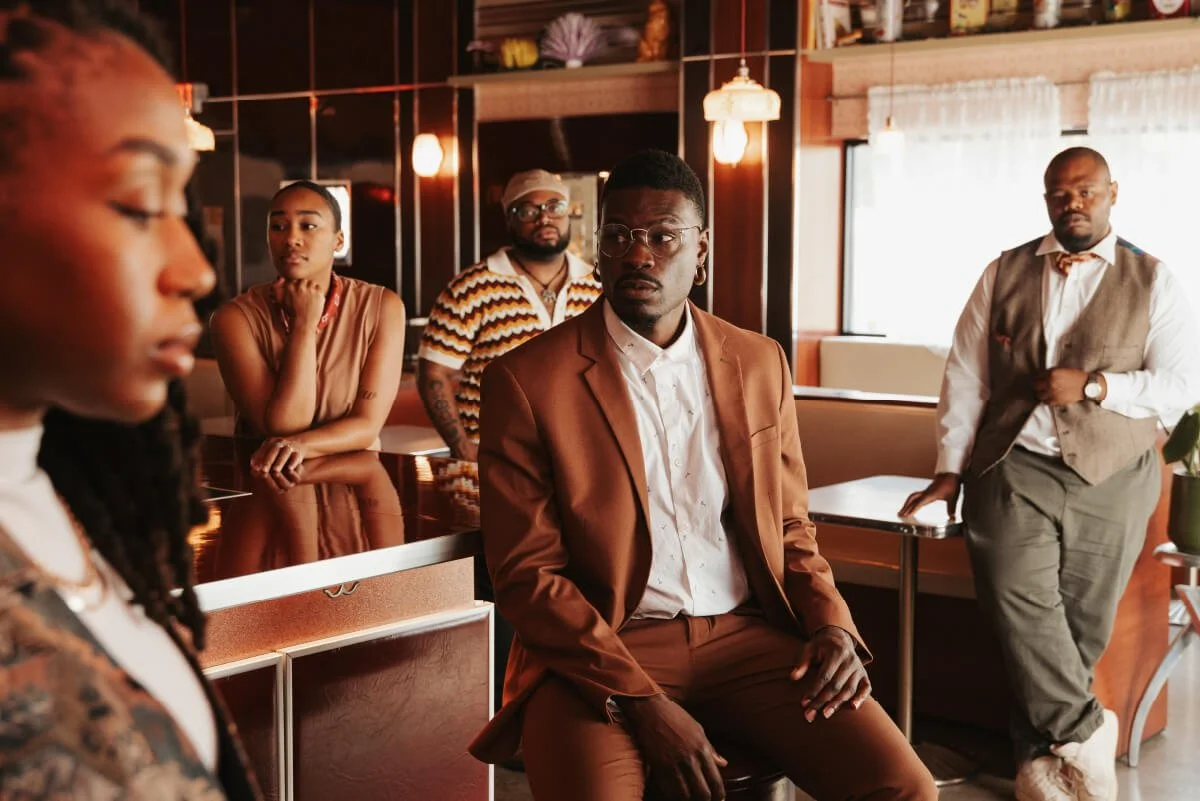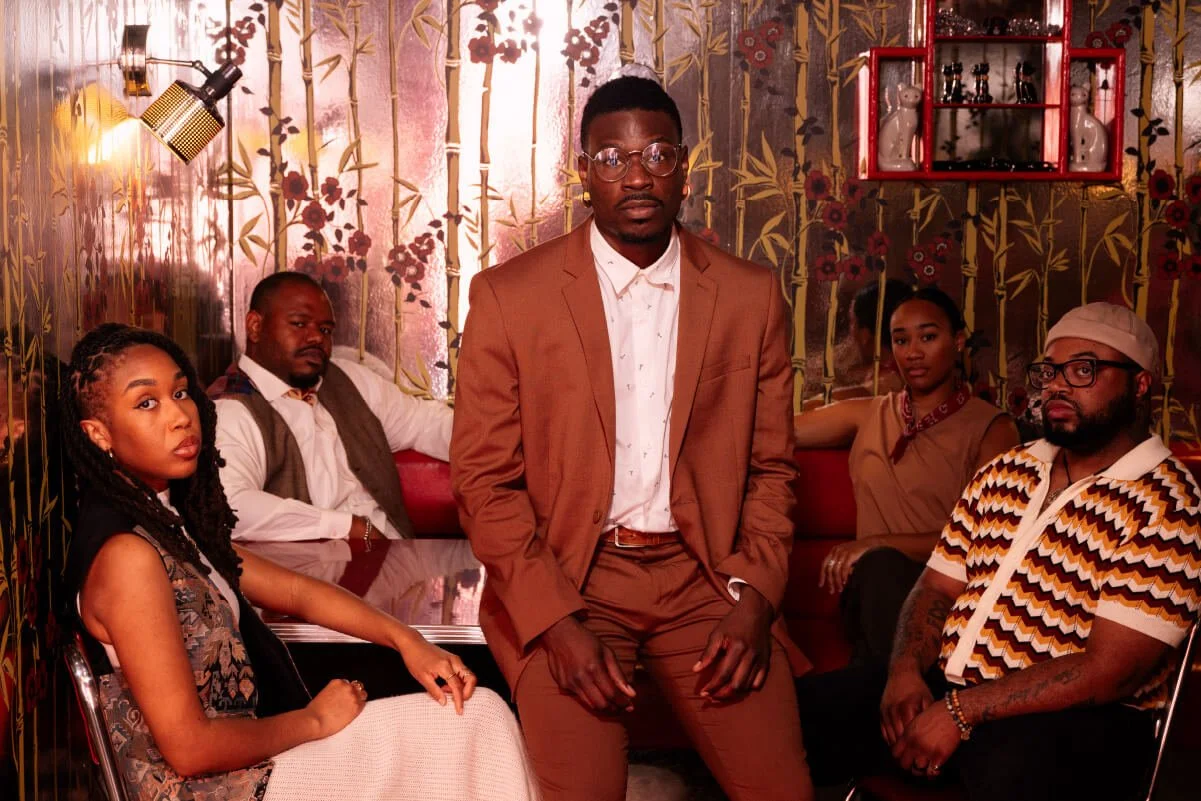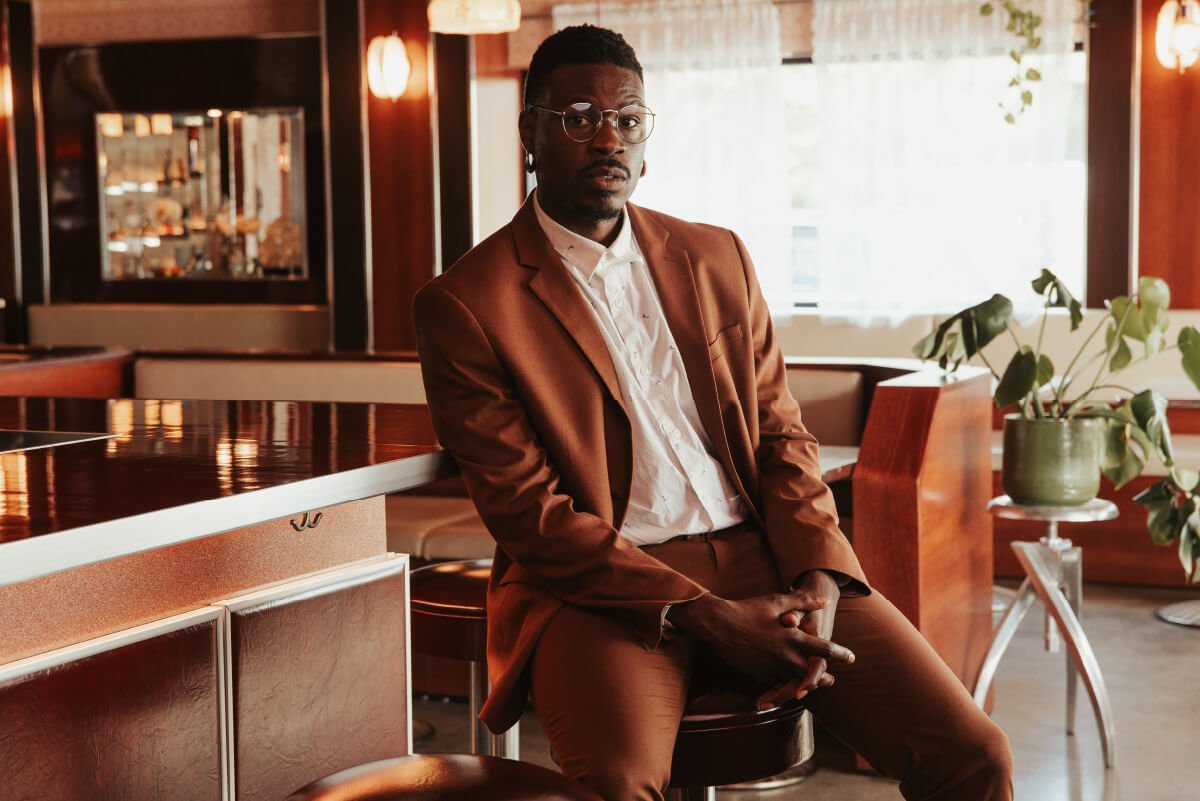Story By: Jonathan Wynn
Photography By: Daniel Meigs
Featuring: Tyquan Morton
Nashville Design Week 2023
Critical Conversations with Tyquan Morton: Designing for Intimacy
Left to Right: Jakia Propst, Mariah Seales, Simba Alik, Tyquan Morton, Joseph Patrick
Ladies and gentlemen let’s talk about it. All things that may sound troubling are never discouraged. My conversation with Tyquan Morton, the creator behind the Sacral Project, was never free, it was liberating. An exchange of words with no lines in between. Exploring issues can sometimes create discomfort in a city like Nashville, especially in the heart of the South. Historically in this region, speaking out on certain topics has led to public scolding and lawful punishment. In a creative approach, The Sacral Project is an expressive outlet and a creative vehicle to help navigate conversations around intimacy, sexuality, and connection. The multimedia use of film and poetry creates a storytelling experience that voices the fear and tension of taboo narratives. The beauty of this project is its focus on community while challenging social constructs in a brilliant way. Tyquan’s love for artist collaboration and different multimedia is intentionally engaging. Each film screening they hosted is curated and sequenced in a way that conveys awareness and recontextualization of unspoken matters - an inclusive direction toward social change.
It was a pleasure to open up with Tyquan about the Sacral Project and how it uses the design of space to create authentic conversations. Join in and follow along our interview.
Jonathan Wynn- A big aspect of Nashville Design Week (NDW) is creating space for critical conversations around the design industry. How do you think the NDW community can benefit from The Sacral Project?
Tyquan Morton- NDW hasn’t had a program about intimacy and sexuality, so there’s that, but we also provide spaces for more vulnerable and honest conversations and introspection - at least that’s the goal. And even though the Sacral Project isn’t just about those topics, I’m excited for attendees to experience the range and spectrum of these conversations.
I think living in Nashville, there has been growing conversations around sexuality and gender expression the last couple years. I really want attendees to leave reflecting on spectrum of intimacy and its role in their lives, and even how it can help us rethink how we design. Honestly, design isn’t just architecture and tangible art; it can be how you design a space for a city to have more authentic conversations about who they are.
Jonathan Wynn- Indeed! Design can be so much more. I love it. So, you’re from the South, but not from Nashville. Enlighten me about your humble beginnings to currently being a Nashville citizen today.
Tyquan Morton- I was born and raised in Charleston, South Carolina and I have Geechee heritage. Back home is called the “Holy City”. There are literally churches on every corner. Constant messages of traditional and conservative values around the city. So many of the “isms” and “phobias” have roots in Charleston, and sometimes, it felt unsafe to fully be myself there. I started performing spoken word poetry in 2015, or 2016. That was around the time of the Mother Emanuel Church shooting. So many shootings were happening around that time, but this particular shooting was an awakening for me. I think this allowed me to see my art as a social resistance for climate change. I didn’t know how to have these conversations without art and community collaboration. My work was just about trying to figure out a collective problem.
I moved to Jacksonville, Florida to be a teacher through Teach For America and did that for three years. I released a chapbook titled, “Remembering Pluto” around that time, too, but I got burnt out quick and wanted to make a career change, so I started to look for grad schools. In 2020, I came to Nashville to attend grad school at Vanderbilt University for a degree in Organizational and Community Development. I had been ducked off from the local poetry scene since I moved because of school and the pandemic, but the one spot I went to for my first open mic was a jazz bar --- where the host said that I couldn’t read anything political or sexual. I was confused as to why they were telling people that, especially when so much of our existence is wrapped in some politics that is out of our control. But that experience made me think deeper about peoples’ understanding of sexuality and intimacy.
Tyquan Morton
Jonathan Wynn- Wow, you went in. So now, you have me thinking about how a person’s existence has some political tie to the South’s unwritten code that is engrained, especially with the different intersectional ties that makes up a person.
Tyquan Morton- I wanted to be rooted in intersectional framework, so thank you for pointing that out. But yeah, there’s so much historical, social, and cultural context we need to understand and reckon with. Being from and living in the South, there’s so much that has happened that impacts our present day.
I mean so many of us were just used for our bodies in some capacity historically. When we do something for pleasure, intimacy, or connection; all of those things, that’s creative and spiritual work. It helps us self-actualize and become more powerful. I think sometimes we also don’t know something is unwritten because we’re unaware of it, you know? So, I want people to leave being more aware about nuances and impact.
Jonathan Wynn- Exactly! I wanted to make sure you touch on the engrained ties that affects us in intimacy and connection.
Aside from that, another question that comes to mind is why are you big on community collaboration in this project?
Tyquan Morton- My craft as an artist is rooted in collaboration, and call-and-responses. Originally, the series was going to be a project based on the collection of poems that I wrote during the pandemic about this reconciliation with intimacy. But the more I sat on them, I realized multiple perspectives are more impactful than one. We all have our own perspectives, but what would the impact be if we combined them, ya know? I see the project as world building, and I can’t build a world by myself, it needs to be with others. I also think the collaborative nature of the project shows us how unique and universal our experiences are.
Jonathan Wynn- Within this universalism, you are intentional about involving and collaborating with Black and Brown artists. Why is this important to you?
Tyquan Morton- Historically, lived experiences of indigenous, black, and brown people have been undervalued and misrepresented. Our stories are not as loud and visible as they should be, especially in a city like Nashville. The city is going through a big transformation and there are so many talented poets and filmmakers that needs to be represented. I think bell hooks talks about peoples’ stories being written by people who don’t share their experiences, and I don’t want that to be the case. So for me, it’s important to highlight work that is important for the community to see. It’s also been cool to see the project spread and to connect with people throughout the South and beyond. I believe the project represents artists from various cities - Charleston, Jacksonville, New York, Philly, LA, Albuquerque, and Minneapolis. And they all have their own styles and perspectives.
Jonathan Wynn- Within these different styles and perspectives, you use different mediums in Sacral to tell the story. How did this come about?
Tyquan Morton- The format for The Sacral Project was inspired by Terence Nance’s Random Acts of Flyness and Jatovia Gary’s Quiet As It’s Kept. They both use a range of mediums from narrative films to animations to archival footage to get their message across. I got to a point in my own poetry practice, where I felt like my words needed to go beyond the page. I felt like it needed to go beyond a traditional open-mic stand. In the midst of that realization, I fell in love with film and wanted to combine those two mediums. And I’ve been able to connect with so many amazing filmmakers and poets here in Nashville like Eugene Johnson, Simba Alik, Wisdom Way, and Jakia Propst. I really believe inviting multiple mediums on a project adds layers of depth and nuance to the subject matter. In addition, the multilayering makes the story easy for the audience to receive.
Jonathan Wynn- Awesome, awesome. Well, you know I’ve been more focused on the South when it comes to this conversation, but I do want to know how else do you want the Sacral Project to grow?
Tyquan Morton- Our strategic visions for the next year will focus on scaling and sustainability. We are planning a screening tour this Fall and Winter that will start in Chattanooga. We are also in talks about distributing our first collaborative episode, How do you feel safe? We still plan to design immersive in-person film screenings and poetic installations in Nashville, though.
We will also be publishing CITRINE, a semi-annual journal of poetry, art, and essays about the nuances of intimacy and connection, Spring/Summer ’24. We’ll be making an announcement about that later this year and will be accepting submissions in January.



